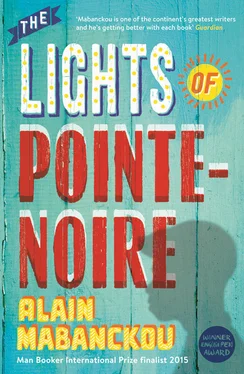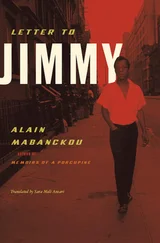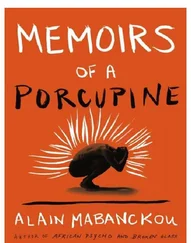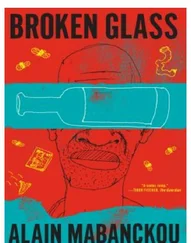‘Well done, children! Well done! And now give me a belch, to show how good it was! Come on, a nice big belch! Quick!’
This was another of the customs she had brought with her from the village: she needed to hear her guest belch, or her face would grow troubled, and she felt her food could not have been nice. But even after you belched — to her delight — she would pile up your plate again and stand in front of you, to make sure you finished it, and gave another belch, even louder than the last. And she would point out which bit of meat to eat first, even instructing you to drink lots, to make sure your food ‘went down well’ and you had enough room in your stomach for even more. Even while one cooking pot emptied, as she served up food to all comers, she was getting the next one on the fire, and reeling off from memory the names of people who hadn’t eaten, with a large wooden spoon in her hands:
‘I know Albert’s twins, Gilbert and Bienvenüe, haven’t come by yet, or Jean-Pierre Matété and Mompéro, who were supposed to drop in today. And then there’s Sabine and Dorothée, and I mustn’t forget Kengué, Kimangou, Mizélé, Ndomba, Ndongui, Miyalou Kihouari, Milébé, Matété, Nkouaka, Marie, Véronique, Poupy, Firmin, Abeille, Jean de Dieu or René…’
You’d hear her saying to herself as she roamed round her kitchen in a cloud of smoke:
‘I’m worried I’ll run out of manioc! Who else have I forgotten?’
One time, when we just weren’t hungry, we thought we’d found a way of avoiding her. You just had to go via the street behind, parallel to the rue de Louboulou. It worked for a while, and Grandma Hélène got in a great state over the defection of so many kids:
‘Where have all the children gone? Are their parents stopping them from coming to eat here? I’ve been keeping their food for two days now, I’m sick of heating it up!’
It was upsetting to see her go to a public tip three days later and unload the rotting food, with tears in her eyes, while emaciated stray dogs circled around. She cursed herself for having such an ungrateful family, but the next day she’d start over again, doing what she did best in this world: cooking for others.
Dieudonné Ngoulou, a hearty eater, who had remained loyal to her, and who we were mean to, because he was the weakest and most cowardly of all of us, revealed all to the old lady. Imagine our surprise when we found Grandma Hélène watching out for us at the corner of the rue de Louboulou and the Avenue of Independence at mealtimes, crouching down behind a mango tree, still with her legendary wooden spoon in her hands. Like a wounded cat fighting back, she would leap out, catch the crafty beggar by his shirt and drag him bodily back to her kitchen:
‘Thought you could pull a fast one on me, did you? Thought you were cleverer than me? Well, you can eat three helpings for me today, because I haven’t seen you for three days! You need to catch up! Come on, hurry up, I’ve no time to waste!’
She had an obsessive fear of whites, mixed with absolute deference. She firmly believed that a few days before her death, a white woman would come and kiss her on the forehead, and open the doors to the next world, so she could pass on and complete up there what she had begun here below.
‘It’s the whites who take people off to the country where the sun never rises, and I know a white woman will come to fetch me when my time comes…’
She would say this whenever there was a wake in the neighbourhood. Most people dismissed it as the ramblings of an elderly person whose mental faculties were waning as she approached the fateful day of her demise. But Grandma Hélène took it seriously.
Several months before developing the illness which would paralyse her, she began putting her affairs in order, to people’s surprise:
‘My body’s packing up. I’m getting sicker all the time. I can’t cook properly any more. The white woman’s not far off now, I see her in my dreams. I wish she’d hurry up and set me free…’
She bought a large metal trunk and a suitcase, and put them in a corner of the dining room, under an old piece of furniture. Her things were inside, and she could be heard muttering:
‘I’ll be cooking for other people in the land where the sun never rises, so I mustn’t forget my spoon… I don’t care about pots, they’ve got them up there, but I’m not going without my wooden spoon, it’s what gives my food its flavour…’
Sometimes she would get up in the night to check everything was in order, that she hadn’t forgotten anything. Reassured, after a session of careful stocktaking, which sounded like a litany of her final wishes, she would go back to bed, lie down, fold her arms and, finally, close her eyes. All this time, the illness was gnawing away at her puny, pain-racked body.
Everyone knew that the fateful hour could not be long now, as for several months she had cooked for no one and had lain pinned to her mattress in the dining room, her eyes riveted on her bags, and on the photo of the Virgin Mary. When they told her I was coming any day now, she didn’t react and her visitors thought she must have forgotten who I was…
At the entrance to Grandma Hélène’s plot, stifling her emotion at seeing me after all these years, Mâ Germaine warns me:
‘She won’t recognise you. She doesn’t even know I’m her daughter now, and every time I go near her she’s terrified, as though I’m an evil spirit! Since she took to her bed, she hasn’t known anyone. And she hasn’t seen you for twenty-three years…’
I go on into the room anyway. The first thing I see are the old lady’s belongings, piled up in a corner. The Virgin Mary looks sad, hanging there on the wall. It smells like a stable, and no one thinks to open a window to air it.
I go over to the mosquito net and see a human shape inside it, twitching from time to time. It’s her, the old lady. Covered in white sheets of doubtful cleanliness, she lies still now, prisoner of a mysterious illness, which forces her to stay stretched out on her back, excreting and pissing on to the mattress, which is on the floor. She sees the visitors at a distance and groans:
‘I’m in pain, I’m in terrible pain…’
Grandma Hélène is by now a human wreck, bound to this world only by the air she breathes. Curled up inside her white mosquito net, as though she’s already in a coffin, she looks almost like a corpse awaiting burial…
‘She won’t recognise you,’ insists Mâ Germaine.
I ignore her warning and draw aside the mosquito net, so I can see her.
There she is, curled up in the foetal position, her face relaxed. She senses my presence and opens her eyes as I lean over towards her.
With a quick movement, she grasps hold of my hand:
‘Is that you?’
Though I am not sure whether she has really recognised me, I nod. And then, to my utter amazement, I hear her babbling:
‘You see, my child, I’m proud of myself now, the food I gave you when you were a child has made you grow up big and strong, you’re nearly two metres tall… But anyway, that’s all in the past now, it’s done with, and I’m dying now, like your mother, Pauline Kengué, and your father, Kimongou Roger, and your aunts, Bouanga Sabine and Dorothée Louhounou, and your uncles, Albert Moukila and René Mabanckou, except at least I’ve been lucky enough to see you before I go to join them…
‘You aren’t going to die, Grandma…’
‘Oh, look at me, what have I become? A corpse! Was I like this when you left me? It upsets people to see me like this… If I still had the strength I would have killed myself, but I can’t move without help now, and no one wants to help me leave this life, not even my husband…’
She begins to shudder, there is fear in her eyes:
Читать дальше












